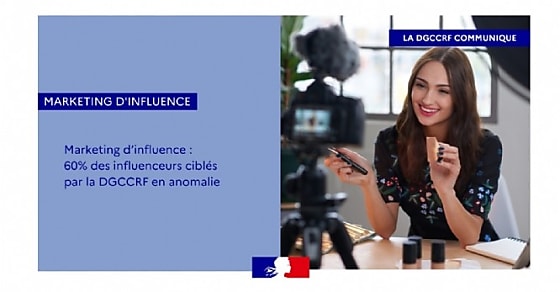The DGCCRF is investigating the business practices of influencers. According to her findings, of the sixty influencers she has targeted since 2021, 6 out of 10 were failing to comply with advertising and consumer rights regulations. He thus initiated various proceedings to call to order, even sanction the guilty. Faced with the problems of consumer protection, especially the younger ones, the DGCCRF maintains its vigilance in the sector and intensifies its controls.
Expanding in recent years, the profession of influencing and creating content today presents many socio-economic challenges. The use of influencers to promote products or services has greatly developed, in particular to allow companies to reach young consumers who are particularly attentive to social networks. Following this development, the Directorate-General for Competition, Consumers and Fraud Prevention (DGCCRF) has been conducting surveys for several years to monitor the commercial practices of influencers and compliance with consumer protection provisions.
In order to verify compliance with these provisions, the services of the DGCCRF have targeted and controlled since 2021 more than sixty influencers and agencies, active in the promotion of products and services such as food supplements, “slimming” programs, cosmetics or online trading or betting services. The checks particularly targeted influencers with a very significant number of subscribers or who were reported by consumers. On that occasion, the services found that the practices of 60% of the verified influencers presented anomalies with respect to the legislation.
Therefore, all the influencers of the anomaly have not complied with the rules relating to the transparency of the commercial nature of their publications. Among these, some have also deceived consumers about the properties of the products sold (false anti-covid claims, organic or natural products that are not organic, etc.) or promoted risky products or services, especially in the field of sports betting, freeing themselves. by the regulations governing these products. In the most serious cases, some influencers have carried out unauthorized promotional operations, such as using the professional training account (CPF) to recover cash or gifts, and then diverting money dedicated to training, or that of injections for aesthetic purposes by beauticians and non-health workers, a practice not without health risks. Finally, some influencers who practice dropshipping forget the associated rules, in particular, in this case, their obligations as a seller towards consumers.
As a result of these observations, the DGCCRF services have launched various procedures for offenders to be sanctioned.
Depending on the degree of seriousness, the follow-up given to the investigations will range from a warning to the transmission of the complaint to the public prosecutor. Misleading commercial practices, such as concealing the commercial nature of a publication, can in fact be punished with two years’ imprisonment and a fine of up to €300,000. The influencers’ practices also give rise to injunctions, the failure to comply with which is also liable to a fine. Finally, these follow-ups can be accompanied by advertising measures which inform the public of the facts observed and the follow-up given.
Like traditional advertising industry players, influencers must abide by all the rules that apply to advertising. They must, for example, indicate whether their publication is of a commercial nature (direct or indirect remuneration by the company) or comply with the specific terms and conditions of advertising relating to certain products or services (financial services or gambling) as well as advertising bans (tobacco/alcohol, drugs, dangerous products, etc.). These provisions are important to enable consumers to be informed in a transparent and secure way and to ensure fair competition in the advertising sector.
The DGCCRF’s checks show the still insufficient appropriation by some influencers of the rules that apply to advertising. The DGCCRF therefore remains extremely vigilant to protect consumers, especially the youngest, in the face of the shortcomings of some players in the influenza sector. In the coming months it will intensify the controls.
Furthermore, to prevent these negative actions from harming consumers and the development of the sector, Bruno Le Maire, Minister of Economy, Finance and Industrial and Digital Sovereignty, has initiated a co-construction approach to support and better regulate the influence activity. A public consultation is open on the make.org website until 31 January. This consultation allows all French people to express themselves on 11 measures divided into four themes: the rights and obligations of influencers, intellectual property, consumer protection and governance of the sector.
Some advice for consumers
The DGCCRF first recommends consumers to pay attention to ads offered on social networks and promoted by influencers. It is important to take the time to reflect and not succumb to compulsive buying, carefully compare product prices and features between different sites before ordering and competing. Finally, if the identity and contact details of the seller (including address, e-mail or telephone number) do not appear on the e-commerce site promoted by an influencer, it is better not to buy from this site. It has also set up a section on its SignalConso platform dedicated to unfair business practices on social networks, and invites aggrieved consumers to leave a report there.
#Influencer #marketing #influencers #targeted #DGCCRF #anomaly








Comments
Post a Comment